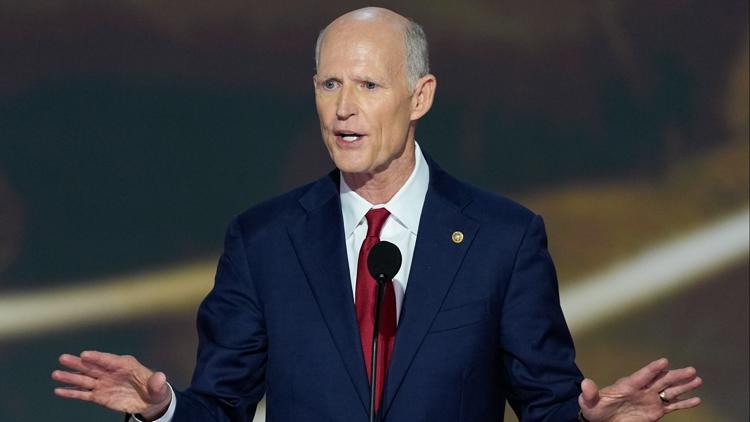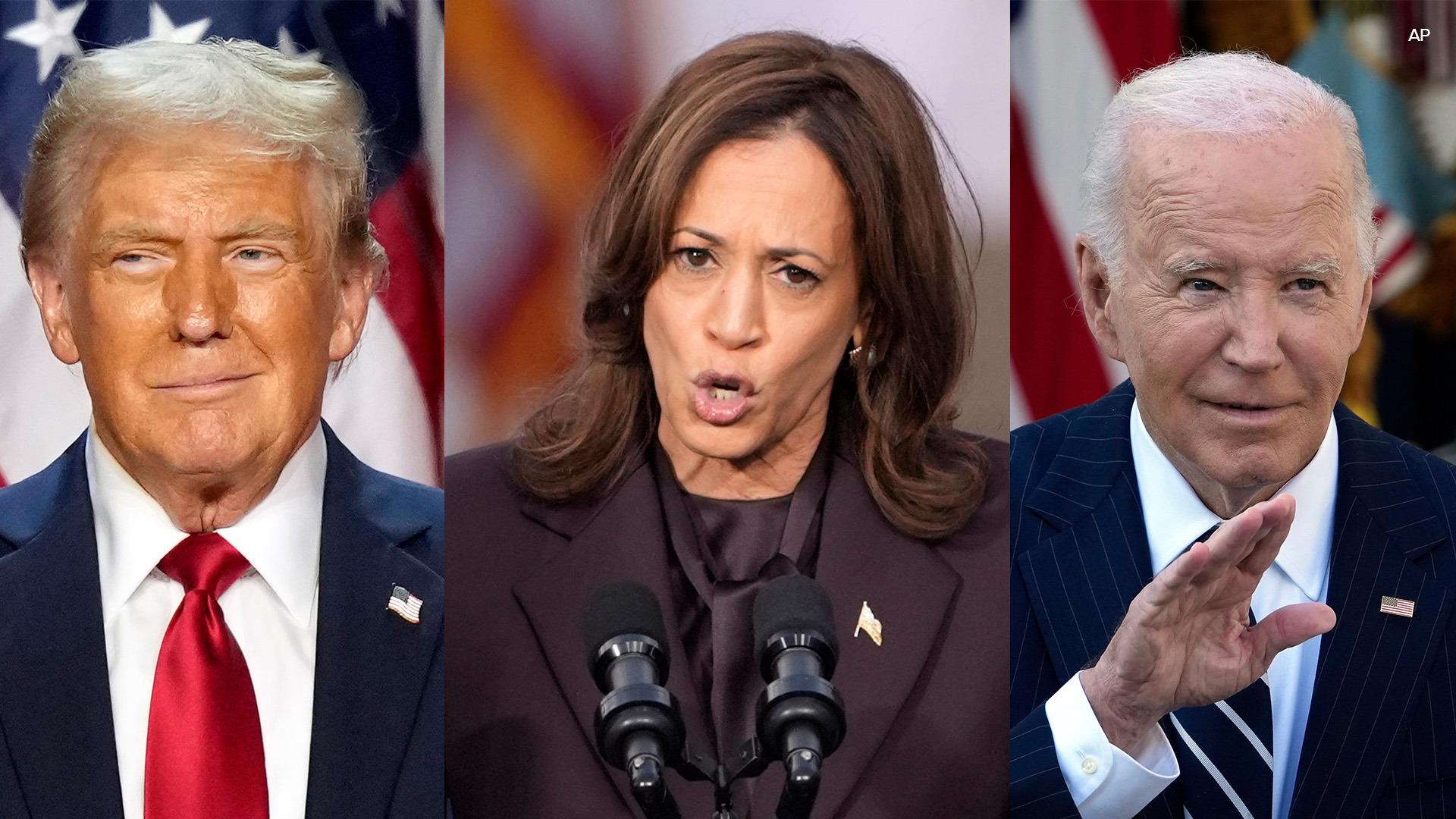TALLAHASSEE, Fla. — Republican Rick Scott's bid for renomination for a second Senate term tops the list of races that Florida voters will decide in Tuesday's primary.
Scott is heavily favored against challengers John Columbus, an actor and former Walt Disney World performer, and Keith Gross, an attorney who twice ran for Georgia’s state House as a Democrat but now supports Donald Trump.
Gross said in a 2023 interview that he was prepared to spend $20 million to $30 million of his own money to unseat Scott. Federal campaign finance records indicate that Gross loaned or donated his campaign $2.4 million and had about $13,000 in the bank as of July 31. Scott had nearly $3.9 million in the bank and raised more than $30 million over the course of the campaign. Columbus trailed far behind both candidates in campaign funding.
In the Democratic primary, former U.S. Rep. Debbie Mucarsel-Powell leads a field of four candidates in fundraising. Powell’s main opponent was Phil Ehr, a retired Navy commander, but he withdrew from the race in October. Ehr is now running for the House seat that Mucarsel-Powell lost to Republican Carlos Gimenez in 2020.
Mucarsel-Powell has raised $14.4 million and began the month with $4.4 million in the bank, far ahead of any of her remaining primary opponents.
Democrats face a daunting Senate electoral map in a year when they’re defending vulnerable seats across the country.
If Trump wins the White House, Republicans would need a net gain of only one seat to retake control of the chamber, and they would almost certainly get in West Virginia, where Democratic Sen. Joe Manchin is retiring. The Florida race gives Democrats one of their only chances to go on the offense against a Republican incumbent.
Scott is not only looking beyond the primary to his expected contest with Mucarsel-Powell, but he also is strategizing for a new role in the next Senate. In May, he said he would run for Senate Republican leader to replace retiring Sen. Mitch McConnell of Kentucky.
Florida voters will also decide 30 contested House primaries.
In the 8th Congressional District, three Republicans and two Democrats running to replace Republican Bill Posey, who is retiring after eight terms. Former state Senate President Mike Haridopolos is the best-known and best-funded candidate in the Republican field. He faces Joe Babits, an attorney and former Security and Exchange Commission official, and John Hearton, a former technology company executive.
The Democratic nominee will be either attorney Sandy Kennedy or Daniel McDown, a member of the West Melbourne city council. Trump carried the heavily Republican district twice with 58% of the vote.
Democrats and Republicans each will hold five contested state Senate primaries. Thirty-five state House primaries are contested. Half of Florida’s 40 state Senate seats and all 120 state House seats are up for election. Republicans hold more than 2-to-1 majorities in both chambers.
A look at what to expect on Tuesday:
Primary day
The last polls close at 8 p.m. EDT, although polls in most of the state close at 7 p.m EDT.
What’s on the ballot
The Associated Press and 10 Tampa Bay will provide vote results and declare winners in contested primaries for U.S. Senate, U.S. House, state Senate, state House, and several state attorney and public defender positions.
Who gets to vote
Only voters registered with a political party may participate in that party’s primary. Democrats may not vote in the Republican primary or vice versa. Independent or unaffiliated voters may not participate in either primary.
Decision notes
Once the nation’s preeminent battleground state in national elections, Florida has tilted to the right since the 2000 presidential election. Registered Democrats had outnumbered registered Republicans in Florida for at least 50 years dating back to the early 1970s. Republicans overtook Democrats in registration after the 2020 election, and that advantage grew to a lead of about 1 million voters as of August.
Although Democrat Joe Biden received 48% of Florida’s vote in 2020, his then-reelection campaign chair, Jen O’Malley Dillon, said in a podcast interview in June that Florida was not a battleground state, even though an April campaign memo described an “opening in Florida.” She's now with Kamala Harris' presidential campaign.
Key areas in statewide elections are the Gold Coast counties of Miami-Dade, Broward and Palm Beach, as well as the counties along the so-called I-4 Corridor, including Hillsborough and Orange counties, home to Tampa and Orlando, respectively.
The AP does not make projections and will declare a winner only when it’s determined there is no scenario that would allow the trailing candidates to close the gap. If a race has not been called, the AP will continue to cover any newsworthy developments, such as candidate concessions or declarations of victory. In doing so, the AP will make clear that it has not yet declared a winner and explain why.
Machine recounts in Florida are automatic if the vote margin is 0.5% of the total vote or less. If the machine recount results in a vote margin of 0.25% of the total vote or less, a manual recount of overvotes and undervotes is required. The AP may declare a winner in a race that is eligible for a recount if it can determine the lead is too large for a recount or legal challenge to change the outcome.
What do turnout and advance vote look like?
As of Wednesday, there were about 13.6 million registered voters in Florida. Of those, 32% were Democrats, 39% were Republicans and 26% were independents not affiliated with any party.
In the 2022 midterm elections, turnout was about 11% of registered voters in the Democratic primaries. About 72% of votes in that election were cast before primary day. Republicans did not have contested statewide primaries that year.
As of Thursday, more than 347,000 ballots had been cast before primary day, about 40% in the Democratic primary and 47% in the Republican primary. About three-quarters of the pre-primary day vote was cast by mail, with the remainder cast early in-person. Slightly more Democrats cast their votes by mail than Republicans, while Republicans cast roughly two-thirds of the early in-person vote. The early voting period began Aug. 10 and concludes on Saturday.
How long does vote counting usually take?
In the 2022 midterm primary, the AP first reported results at 7:01 p.m. EDT, or one minute after the first polls closed. The election night tabulation ended at 1:14 a.m. ET with about 99.9% of total votes counted.
Are we there yet?
As of Tuesday, there will be 77 days until the November general election.



